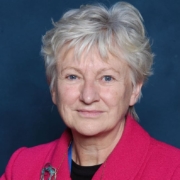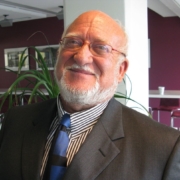Michele Schweisfurth
Unpacking the Learning Crisis
Today we explore the learning crisis in education. In particular, we unpack the crisis narrative, which has reached a crescendo during Covid-19.
With me is Michele Schweisfurth, a Professor of Comparative and International Education at the University of Glasgow. She has a new article in the International Journal of Educational Development entitled “Disaster Didacticism: Pedagogical interventions and the ‘learning crisis.’”
Citation: Schweisfurth, Michele, interview with Will Brehm, FreshEd, 311, podcast audio, March 6, 2023.https://freshedpodcast.com/micheleschweisfurth-2/
Will Brehm 0:00
Michele Schweisfurth, welcome to FreshEd.
Michele Schweisfurth 0:09
Thanks very much, Will. It’s great to be here.
Will Brehm 1:07
So, ever since COVID, there has been this idea that’s sort of circulating in education circles called learning loss and the learning crisis. And it sort of nowadays seems to be rather commonplace and has maybe perhaps reached some sort of a crescendo. What does it even mean? What does learning loss even mean?
Michele Schweisfurth 1:25
The language of learning crisis has actually been around for quite a while. This predates COVID. Toward the end of the Millennium Development Goal era, there was awareness growing that despite improvements to enrollment rates, and improved access to education, a lot of children in school were not learning. And so that’s when we started to get the language of learning crisis. And learning loss is much more associated with COVID-19 because of the school closures and because of the inequalities that people experienced in terms of the learning that they were able to do -at least the kind of school learning that that is measured during the pandemic. So, both of these things have become very commonplace. We find the language across a whole range of international organizations and aid agencies and national governments, we see new ways of measuring it, such as the World Bank’s Learning Poverty Index. And, you know, the story is pretty worrying and compelling. I mean, the World Bank – whatever the methodological issues might be – claim that 80% of learners in poorer countries are unable to read and understand a simple story by the end of primary school. And that is worrying, of course it is, but we’re also seeing the language escalating. So, it started off with a learning crisis, and then there was the learning loss, and now we’re hearing about learning catastrophe. And seeing this language kind of getting stronger and stronger over time while the problem doesn’t seem to be going anywhere quickly.
Will Brehm 2:58
It is interesting to think that the notion of learning crisis has existed for a while. COVID sort of made it worse. And the learning loss from COVID has made the learning crisis even worse. And we are now approaching some sort of learning catastrophe, or learning Apocalypse, that might exist. And I guess there’s all sorts of really fascinating questions that can be asked. You brought up issues around methodology, issues around, what is it that’s even being measured in terms of learning? Like, how is learning even being understood in this notion of the learning crisis? What do these organizations mean by learning?
Michele Schweisfurth 3:36
The learning the crisis refers to is largely learning that’s measurable. So, the focus tends to be on literacy and numeracy standardized measures, or measures that are least aligned so that they’re comparable. But the focus is very much on the so-called foundational subjects. It is argued that these are the foundational building blocks for all other learning, but it’s also because they are more measurable. So, a lot of what happens in schools, a lot of the learning that children experience, it’s actually much, much harder to measure and certainly harder to compare across different contexts.
Will Brehm 4:08
I interviewed Eric Hanushek years ago, and he basically makes that point. You want to look at learning across countries but it’s so different. And so, you need to come up with something that is sort of quote unquote, comparable, and the easiest thing to do is numeracy and literacy. And then the argument is that if you do those, then they can be proxies for every other type of learning that you might need to look at or think about.
Michele Schweisfurth 4:32
That’s certainly the argument. I mean, I think learning is a very rich area. And there are lots and lots of kinds of learning that go on in school that aren’t necessarily captured. I think part of the problem is that what is measurable then becomes more important, and we get this scenario where we’re measuring what’s easily measured and then something becomes important because it’s easily measured because we have statistics on it. And that’s not me saying that literacy and numeracy are not important. They are, but they’re getting elevated to kind of new heights that is squeezing out other areas. And I think that is a little worrying for me.
Will Brehm 5:08
Yeah. You can see that happening. I think that probably has happened quite a bit. You know, “measurable indicators”, that becomes the goal, rather than what they were supposed to be measuring something about learning, which is a much more difficult sort of concept to even begin to come up with indicators that are meaningful. So, one of the interesting things that you pull out in this new essay is the narrative of crisis and how it actually operates. And I thought this was so fascinating. So, how is this crisis narrative, even operating at our sort of rhetorical level?
Michele Schweisfurth 5:39
In the essay, I draw on a structure that Paul Morris and colleagues used in their analysis, they work with international organizations in kind of COVID and post-COVID era, and they talk about this as a kind of play in three acts. And the first part is presenting the problem. And this is where the narrative of crisis comes in as a mobilizing force. So, you find incredibly strong language there about how we’re on the edge of disaster. And so, we absolutely have to act. And then the next part is the solution then apportioning blame and talking about what’s possible. And then the language shifts dramatically to great promise about what will happen if these solutions are followed through and that we will no longer have this crisis. So, we see this narrative play out across a range of solutions. And in the essay, I talk about three solutions: 1) foundational learning, which is a focus in teaching and learning on maths and reading; 2) digitalization. So, bringing IT into the classroom and collecting data on classroom practices. So, in all three cases, across international organizations, they invoke this crisis, they propose solutions, and they make these promises. And I think what’s interesting -well, there are lots of things that are interesting about that. But one is that some of these solutions have existed for a very, very, very long time, like IT, right? Like foundational learning. These have been things that have been backed by many international organizations for a long time. And now, there is this narrative of crisis that helps to provide traction to these solutions. And that traction includes both discussion and focus of effort, but also resources.
Will Brehm 6:58
Sort of like the crisis allows these solutions to be repackaged. They’ve existed for a long time and now we can repackage them to push an argument to convince the people who might read these reports, which I guess are government’s, right? People making decisions on curriculum? Is that the idea?
Michele Schweisfurth 7:41
It’s a number of possible audiences, including aid agencies who fund some of these larger scale international organizations, including national governments. So, the discourse trickles through everywhere and we find it reaching into research funding, and we find that it’s harder and harder to kind of talk about the broader purposes of education and alternative solutions because these are taking up so much airspace and so many resources.
Will Brehm 8:10
And what about the promises? What is being promised if we only put in these solutions?
Michele Schweisfurth 8:16
Well, better learning for a start, but then greater equality. But often also economic growth, right? So, often these are tied to personal prosperity for people, job readiness, 21st century skills to work in new kinds of economies, but also economic growth for nations and for the world. And I mean, if we think about the purposes of education, yeah, the economic purpose is an important one. But there’s also the civic purpose about creating good citizens and creating global citizens and creating a kind of citizenship consciousness in people, but also the humanistic purpose. I mean, if teaching reading was only about reading, then we’d probably just do phonics, but we don’t. We do literature because that’s part of developing the humanistic purpose of education, connecting people to cultural legacies and learning about other human beings’ feelings, and some of the universals, and pleasure in the arts, all of these things are also very important. But if we reduce it to reading, then we’re missing out on all of that richness.
Will Brehm 9:23
Hence, the reason to focus on numeracy and a very simple ability to read text of a paragraph.
Michele Schweisfurth 9:31
Yes. Which is ostensibly universal. But actually, even that is a little bit more complicated. And certainly, some of the solutions are not particularly universal. So, IT for example, we know that it matters, what teachers believe about IT. We know about the importance of the symbolic meaning of technology before teachers are able to use it fruitfully in the classroom or learners are able to use it independently. So, we can’t escape those ways that these solutions have to fit into a wider pedagogical ecosystem.
Will Brehm 10:07
This whole narrative and how it gets constructed in this sort of Promised Land that it will bring you to if you implement these solutions. It reminds me of, in comparative education, at least the way I was taught in the US, a big focus was on that A Nation at Risk Report from the 1980s in the US, and that sort of had the same crisis narrative. The US was in crisis and losing to the Soviet Union and it’s all because our science and technology education and it needs to change. The crisis narrative sort of worked in that same way for whatever the solution was. And I guess the Promised Land was spreading democracy or winning against the Soviet Union when it was sort of a war time effort. So, I can understand in that case, like the US government, using the crisis narrative for its own sort of geopolitical aims. What’s the purpose, and why would an international organization promote learning crisis today to promote things like foundational literacy, digitalization, the use of data in teaching? Why would an organization want to promote that?
Michele Schweisfurth 11:10
Well, a couple of points first, which is that there is an issue with learning. You know, learning is important. And it’s stagnating in some places, and we need to do something about this. I’m not pretending that we don’t. I also can’t see inside the minds of the people who use this language. I don’t know really what is motivating this use of the discourse of learning crisis, learning loss, learning catastrophe. But I suspect some of it is just thoughtless. Just kind of we’ve been saying it for so long, we kind of can’t stop. I might be wrong. And when I say thoughtless, I don’t mean as in cruel, I just mean as in without thinking about some of the implications of that language. But there are good reasons invoking crisis because it can mobilize focus, it can mobilize resources, and I’m sure that that was a big part of the agenda when this language was started to use. But one of the things that using a language like learning crisis does, it situates the problem in the classroom, in the learners, and it’s starting to morph into a teaching problem as well, sometimes quite explicitly. In some recent reports at the recent GPE policy they talk about the learning crisis is a teaching crisis. So, we start to see the situating of the problem within particular actors. I mean, the language of crisis is used in a lot of sectors. So, like in the UK at the moment, we talk about the crisis in the National Health Service, and we talk about the crisis in care. Now, what if instead of talking about the NHS crisis and care crisis, we talked about the health funding crisis, or the public services funding crisis? That would situate the problem completely differently, but the language that we use places it within a certain set of actors.
Will Brehm 12:53
Yeah. That is interesting how it does locate it. And then I guess you can start seeing blaming of teachers. And that also has sort of a long history, and a lot of these international organizations sort of placing blame on educational developments failures on teachers, since they’re the ones that have the most contact with students. And you see that rhetoric, I think, even the World Bank, didn’t they create some report that had a teacher or something that was missing at his or her desk? And they sort of play up that rhetoric quite a lot?
Michele Schweisfurth 13:22
Yeah, I mean, it’s fascinating how international organizations including some that in the past paid very little attention to classroom processes have suddenly started showing a lot more interest. And this is partly, I’m sure, because of the equality and inclusion agendas in the sustainable development goals. I also feel that I should have been more careful what I wished for, because for years, I wished that people paid more attention to pedagogy in these international organizations and recognized its importance. And now they are but of course, they’re doing it in ways that follow particular paths that different organizations have been following for many years. So, they’re doing something new, but they’re doing it in a similar way, with similar sorts of evidence being privileged and certain sorts of visions of what education is for being privileged.
Will Brehm 14:08
So, years ago, when you were sort of saying you want these international organizations to focus on pedagogy, like in what ways and why? Why did you want them to focus on pedagogy a couple years ago, or whenever you’re talking about?
Michele Schweisfurth 14:19
It’s always been treated as a bit of a “black box”. So, there was a lot of emphasis on funding and other sorts of inputs, and there was a lot of emphasis on outcomes. And then some kind of magic happened that nobody talked about in between, which turned these resources into outcomes. And most international organizations didn’t really dwell too much on this. And I think there are a number of reasons for that. Partly, it’s this measurability issue that we’re talking about, partly it’s the culturally situated nature of those processes. And that’s all fine and I’m quite right. I’m not looking for universal solutions or international organizations to propose pedagogical norms that everyone should be following. But it’s interesting now that they have gone into it, they’re doing it in the ways that we might have expected. And I know not all international organizations are the same. And I know that some of them are taking quite different approaches, but I would love to see a more nuanced approach to pedagogy in international organizations. No matter how hard that is, no matter how difficult it is to set a “what works” agenda based on profound ecosystemic understandings of pedagogy. It would be great to see somebody try.
Will Brehm 15:29
What would that begin to look like, though? Like, what would a nuanced approach to pedagogy look like for some of these organizations that are working in so many different contexts, and countries, and cultures,
Michele Schweisfurth 15:39
I’d like to start with a kinder discourse. And that sounds really incredibly banal, but I actually think language matters. And I think talking about the learning crisis and turning that into a crisis with learners and teachers is not a way that is going to encourage people in a context where we have a real issue with mental health and school disengagement as two of the legacies of the COVID 19 epidemic. But I do think that pedagogy is very much part of a wider ecosystem. In the post-COVID era, we need to be thinking about pedagogy as part of a wider ecosystem for recovery and thinking about not so much what the common ingredients are across different places but how in each place that ecosystem works. And I think international organizations have fantastic resources, and political will, and terrific people working within them. It seems to me that thinking how solutions in scare marks are proposed, and thinking about how they’re contextualized, and how they can be authentically driven and embedded locally, I think there’s space for that. It’s not an easy ask. It’s not going to generate a lot of tidy, comparable statistics. But I think there’s scope for that.
Will Brehm 16:55
It’s an interesting insight, because instead of quote, unquote, solutions being the sort of brainchild of people who work inside these organizations, they could be the brainchild of people who work inside the schools, inside these communities. And teachers, in a way, are best placed, aren’t they? Being members of the community often, interacting with kids all the time, knowing the value and support that schools provide communities, they would be sort of the perfect stakeholder designing solutions for whatever the problem is that they’ve identified, right? But that’s like totally opposite of what a lot of these organizations do.
Michele Schweisfurth 17:36
Absolutely. And I try not to romanticize teachers. There are teachers who have very poor capacity because of their own educational backgrounds, and there are teachers, just as in any sample of human beings, there are people who are motivated by less than noble motivations, but I think, yes, teachers in conjunction with communities, in conjunction with learners as well have something to say about what building back better means to them, and what that might mean for how classrooms operate. And a lot of this has to happen in real time as well. I mean, there’s really interesting ethnographic work done about how teachers respond in a minute-by-minute kind of way to what’s going on in the classroom, and what students collectively and individually need. And that may not always be more math, and it’s certainly not likely to be more tests and squeezing out of those opportunities for connectedness, that opportunity to engage with the arts and so on.
Will Brehm 18:34
You know, this narrowed understanding of pedagogy from some of these organizations and their drive to try and measure it, which then sort of further narrows it. I mean, it’s so hard to figure out why they want to do it. I mean, I think you’ve given a few answers about it, but maybe I just want to sort of circle back into it. Because it’s hard to understand, you know, on the one hand, they might say, obviously, we need to think about the process if we want to get quality education, but then, surely, these are bright people that work in these organizations, and they’re not malicious. There are usually good-natured people that work in these organizations. So, I just don’t understand why it would then sort of turn into these really basic measures that then cause -it’s like the measures end up causing harm, because that becomes the focus. I just don’t know why that happens. With all these potentially smart people in the room, so to speak, you know, the best and the brightest. Why does that happen?
Michele Schweisfurth 19:30
Yeah. I guess there are lots of different kinds of smart. They would probably look at what I do and say, Why is she getting so bogged down, we have a crisis, and we need solutions, and we need solutions that have a kind of international impetus behind them. So, as I said, I think there are very different ways of thinking about these questions. But I think one of the particular logics that is inescapable within some international organizations is that data will give the answer. For example, with the World Bank’s Teach Initiative, where data is being gathered on what teachers are doing in the classroom. Part of me went, Hooray, the World Bank’s in classrooms, and then I kind of went, Oh, no, the World Bank’s classrooms because it was uniform across places, it was based on a particular logic of what evidence looked like, and a particular logic on how these things would work, the training was very centralized and so on. It was troubling to see how that stepping into classrooms that particular intervention then became sort of monolithic. I mean, it’s adaptable. The World Bank Teach instrument is supposed to be adapted. But the capacity that’s being rolled out is the capacity to use the instrument in that training. And I see this – and this is intuition. I don’t have empirical evidence on what’s behind this. But my assumption is that there is this genuine belief that more data will improve things. And what we don’t have is data on teaching. And this is a crisis in itself, I think, from the point of view of a data-driven organization that has relied very heavily on econometric analyses.
Will Brehm 21:13
And sort of positivistic, right? I mean, if you have empirical evidence and more of it, you will be able to best understand the situation. And then when you have a good understanding, then you can actually propose the right solution to make an intervention. So, it’s the belief in empiricism in a way?
Michele Schweisfurth 21:32
Well, yes. And collecting data becoming an end in itself. We’re doing well because we know a lot more now about what teachers are doing. But there’s a missed opportunity there to perhaps also observe how learners are working together or sit down and really work with local actors to deconstruct and reconstruct the instrument so that it is fit for purpose where it’s being used.
Will Brehm 21:57
You know, what’s interesting is I’ve done a little bit of historical research on Theodore Schultz, who was sort of the person to really popularize human capital theory back in the 1950s, and 60s, and even then, in his archive, he has letters where he basically keeps saying, like, I need more data, I need more data, if only I had more data, I could do X, Y, and Z. And he was doing all the statistics by hand back then, so he just had like notebooks and notebooks of him trying to crunch the numbers of whatever survey that he gave. And then the National Bureau of Economic Research (NBER), which puts out a lot of this sort of work, even when they first started, like, a lot of their papers are all about we need more data, like, that’s always the conclusion. And it’s been the conclusion from 60 years or 70 years at this point.
Michele Schweisfurth 22:47
Yeah, we’ve got a lot of data now. We seem to need more but there are lots of cliches about what data can and can’t do. And I do think, you’ve mentioned yourself, some of the washback effects of this data. And we know that testing anything immediately elevates its importance in the minds of teachers and learners. And therefore, time in classroom being a zero-sum game, it squeezes out other things, and people get better and better at taking tests. And then having this data also creates a scenario where you can compare across countries. Now, this has never been the stated purpose of the Teach instrument but that worries me. I’m just waiting for the article that says, you know, 73% of Tanzanian teachers are doing this, but only 42% of teachers in Kenya. Or over time, and without any understanding of what some of the shaping factors might be. So, you can imagine a scenario where the Teach instrument is implemented in in year x, and then five years later again, and we see the situation hasn’t got better, and then opportunity for crisis. It’s teacher bashing time. But so many things could have happened in the interim. There could have been a reform that was just distracting everyone or there could have been a pandemic, or there could have been a national emergency, or war. I mean, there’s so much going on that it’s different teachers and different students, different learners. I mean, the learners who’ve been through COVID, are going to be a different group of students to teach. I mean, you can’t just turn them around after two years of isolation for many of them.
Will Brehm 24:27
You can see how problematic it really would get. I mean, you’ve worked with different international organizations in different capacities over the years. Are they receptive to some of these ideas – in your experience – to talk about pedagogy in a more holistic way. And not necessarily focusing in on the things that are measurable?
Michele Schweisfurth 24:46
Yeah. I mean, I’ve got the greatest respect for my colleagues in international organizations and kind of national aid organizations as well. And I think that on the individual level and collectively within teams there is this receptivity. But if you think about trying to account for the money that you spend, and the investment that you make, that is so much easier to do, if you’ve got the statistics. You know, we can say, we put 100,000 computers in classrooms. That sounds so much better than had this kind of national and local negotiating forum where we talked about what good pedagogy looks like, and designed resources and peer-observation schedules that facilitated that. I think people in these organizations have to think about a number of audiences. They’re always thinking about where their funding base is going to come from, and how they’re going to track that, they have to show that they are improving things. So, I think at the institutional level, there’s a lot of path dependency about sticking with things that are safe, things that the organization is known for, things that can be quantified. The risks are tough to take. I do sympathize but I think that we need to get some momentum behind alternative narratives and alternative solutions so that perhaps those can be plugged into by the people in international organizations who would like to do things a little bit differently.
Will Brehm 26:16
Well, Michele Schweisfurth, thank you so much for joining FreshEd.
Michele Schweisfurth 26:19
Thanks very much, Will. It was a pleasure.
Want to help translate this show? Please contact info@freshedpodcast.com
Related Guest Publications/Projects
Disaster didacticism: Pedagogical interventions and the ‘learning crisis’
When ‘best practice’ meets the pedagogical nexus
Future pedagogies: Reconciling multifaceted realities and shared visions
Revisiting comparative pedagogy: Methodologies, themes and research communities since 2000
Learner-centred education as a political project in Scotland
Is learner-centred education ‘best-practice’?
Learning pedagogy and the post-2015 education and development agenda
Mentioned Resources
World Report: State of global learning poverty 2022
Eric Hanushek – Schools, skills, and economic growth
Paul Morris -Tracing OECD’s evolving narratives within a global development complex
Theodore Schultz publications
National Bureau of Economic Research
Related Resources
An analysis of educational crisis rhetoric from 1951-1985
COVID learning loss: Historical issues, current measurements, and future strategies
Cognitive learning measure: A three-study examination of validity
Measuring learning losses: Key factors, challenges and other measurement issues
COVID and the future of education: Global agencies ‘building back better’
A systematic review and meta-analysis of the evidence on learning during COID-19 pandemic
The theory and practice of learning
Learning poverty global database
Global learning metrics as a ready-made solution to a manufactured crisis
From crisis to reform? Exploring three post-COVID pathways
The World Bank’s construction of teachers and their work: A critical analysis
Quality education through performativity: ‘Learning crisis’ and technology of quantification
Reforms for another planet: The global learning crisis, political drivers and expert views…
The ongoing crisis and the promise of civic education
Humanistic futures of education: Perspectives from UNESCO chairs and UNITWIN Networks
Utopia as a method: A response to education in crisis?
The tail wagging the dog or assessment for learning
Have any useful resources related to this show? Please send them to info@freshedpodcast.com









